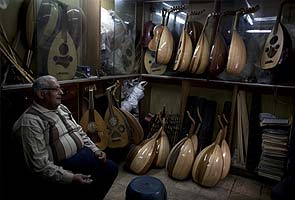
But Mohammed Ali Street is fading. It had already been in decline for years as a music center. Now the crunch of post-revolution Egypt may finish it off, between economic crisis, uncontrolled urban sprawl and the rising influence of Muslim conservatives, its patrons fear.
The street in downtown Cairo, parts of it lined by French-style arched arcades, is now dominated by mobile phone and electronics stores, donkey carts and heavy traffic. The shops making, repairing and selling musical instruments that once packed the street are disappearing, along with their window displays of lute-like, stringed ouds, qanouns - a sort of dulcimer - and tablas - a drum made equally for the rapid-fire handbeats of belly-dance tunes or for the languid rhythms of a love ballad by Umm Kalthoum, the most famed singer of classical Arabic music.
"The street is extinct," he said, sitting at a coffee shop that now serves as his office. "When I die, there will be no more music. No one is learning it."
The street, named after the founder of modern Egypt, was built in the 1860s as part of a new downtown that was to modernize Cairo. Inspired by French architect Baron Haussmann, the designer of Paris' grand boulevards, Egypt's then-ruler Khedive Ismail sought to "make Egypt a piece of Europe." The result was downtown of avenues and city squares lined with arches and European architecture, between the Nile and the old medieval city of Cairo, with its Islamic architecture and maze of narrow alleys.
Mohammed Ali Street was the connector between old and new Cairo, modeled after Paris' famous Rivoli street. Over the next century, it became entertainment central, home to the musicians, dancers and workers of Cairo's cabaret nightlife. El-Fayyoumi recalls how he once lived in the same building as Lucy, one of Egypt's most famed belly dancers who rose to become a movie star as well. The street was also the destination for anyone looking to buy the best Oriental music instruments, arriving from around the region, Europe and the U.S.
El-Fayoumi, who is a member of one of Egypt's oldest and best known percussion music bands, called Hassaballah, has worked in this trade for over 45 years. None of his children wanted to follow his footsteps.
Now he's feeling the country's economic woes. Lack of security and tightening budgets have made big events scarcer. Parties and events are getting fewer and further between. Instead of three or four events a week, he said, now the band can wait up to 10 days before they get a gig. His band has to settle for far less money for each gig as well.
And newly emboldened Islamists, who disapprove of music and the perceived "decadence" of the nightlife, are also squeezing people in his trade. He said a group of young zealous Islamists have tried to convince him to quit and be a "good Muslim." He has rebuffed them, suggesting he doesn't need anyone to teach him religion.
"I am a regular at the mosque. That is the only other place I go besides the coffee shop."
No comments:
Post a Comment